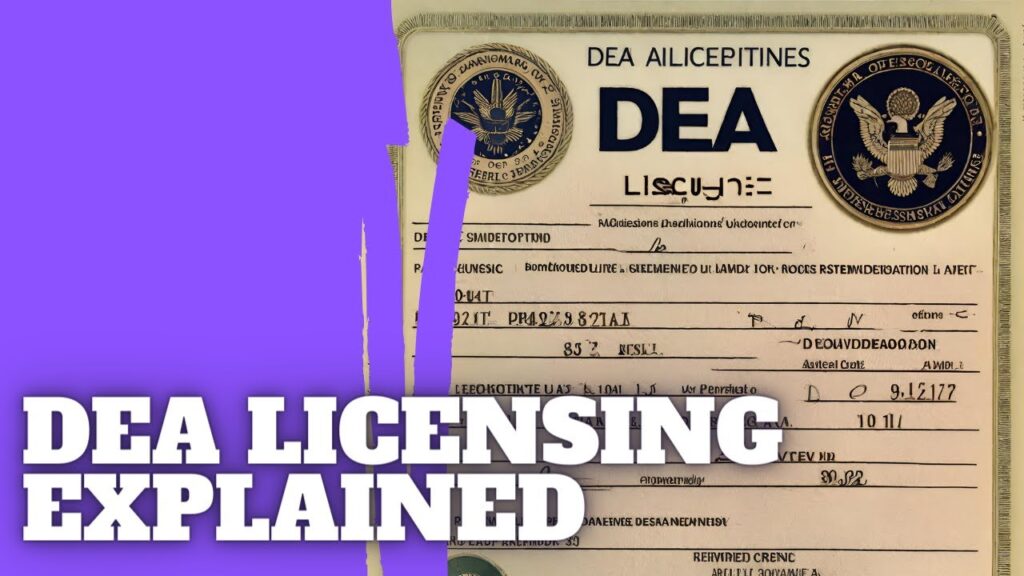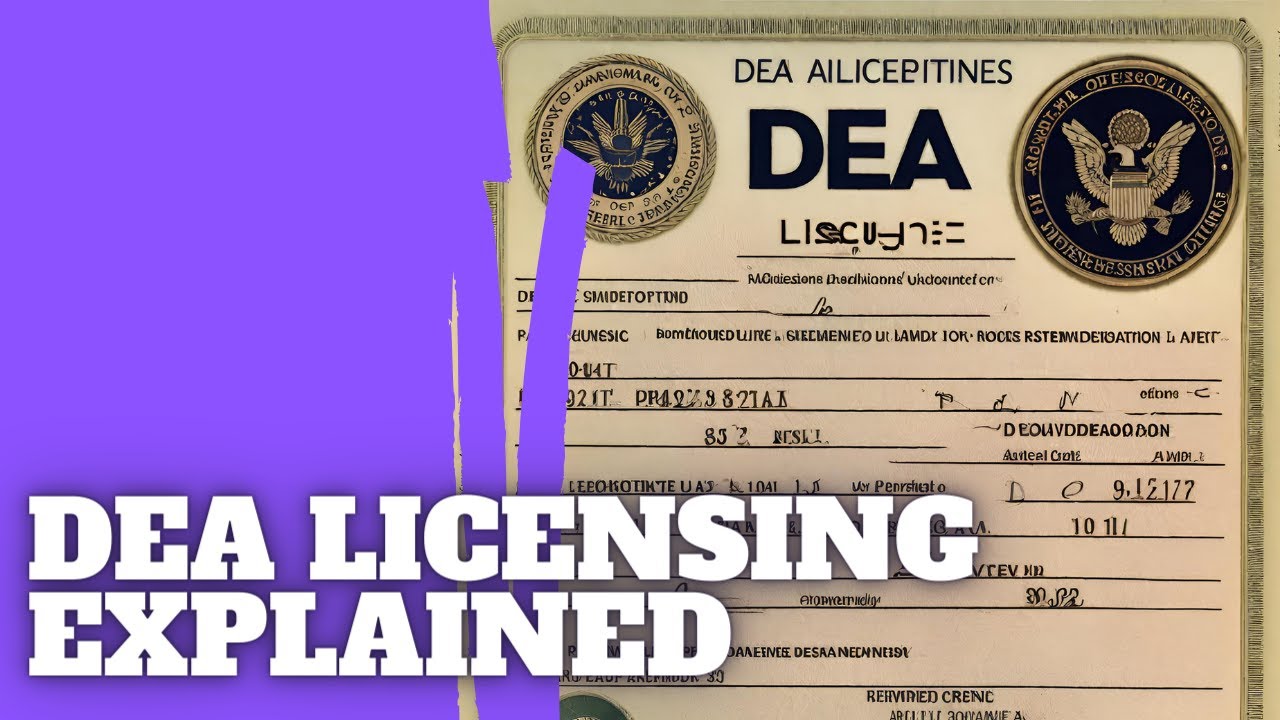
Navigating the Federal DEA Renewal Process: A Comprehensive Guide
The Federal Drug Enforcement Administration (DEA) registration is a crucial requirement for healthcare professionals who handle controlled substances. Maintaining a valid DEA registration is paramount to ensure compliance with federal regulations and to continue prescribing, dispensing, or conducting research involving controlled substances. This article provides a comprehensive guide to navigating the federal DEA renewal process, covering essential steps, potential pitfalls, and best practices to streamline the process.
Understanding the Importance of Timely DEA Renewal
Failing to renew your DEA registration on time can have serious consequences. An expired DEA registration can lead to the suspension of your ability to prescribe controlled substances, potentially disrupting patient care and impacting your professional practice. Furthermore, practicing with an expired DEA registration can result in legal repercussions, including fines and disciplinary actions. Therefore, understanding the federal DEA renewal process and adhering to the deadlines is crucial for all DEA registrants.
Who Needs to Renew Their DEA Registration?
Any healthcare professional who prescribes, dispenses, or conducts research with controlled substances is required to hold a valid DEA registration and must renew it periodically. This includes physicians, dentists, veterinarians, physician assistants, nurse practitioners, and other qualified healthcare professionals. The specific requirements for federal DEA renewal may vary depending on the registrant’s profession and the type of activities they conduct with controlled substances.
The DEA Renewal Timeline
The DEA sends renewal notifications approximately 60 days prior to the expiration date of the current registration. It’s crucial to ensure that the DEA has your current mailing address to receive these notifications. If you do not receive a renewal notification within 45 days of your registration’s expiration, it is your responsibility to contact the DEA to request a renewal application. The federal DEA renewal application should be submitted well in advance of the expiration date to allow sufficient processing time.
Steps Involved in the Federal DEA Renewal Process
- Receive Renewal Notification: The DEA will send a renewal notification to your address of record approximately 60 days before your registration expires.
- Complete the Renewal Application: Access the DEA’s online portal or request a paper application. Fill out the application accurately and completely. Be prepared to provide information about your practice, controlled substance activities, and any relevant state licenses.
- Pay the Renewal Fee: The federal DEA renewal requires the payment of a fee, which can be paid online or by mail. The current fee schedule is available on the DEA website.
- Submit the Application: Submit the completed application and payment through the DEA’s online portal or by mail, following the instructions provided.
- Monitor Application Status: You can track the status of your renewal application through the DEA’s online portal.
- Receive Confirmation: Once your application is approved, you will receive confirmation of your renewed DEA registration.
Common Mistakes to Avoid During DEA Renewal
Several common mistakes can delay or prevent the successful renewal of your DEA registration. These include:
- Failing to Update Address: Ensure that the DEA has your current mailing address to receive renewal notifications.
- Submitting Incomplete Applications: Carefully review the application and ensure that all required fields are completed accurately.
- Missing the Deadline: Submit the renewal application well in advance of the expiration date to allow sufficient processing time.
- Incorrect Payment: Ensure that you pay the correct renewal fee using the accepted payment methods.
- Ignoring Communication from the DEA: Promptly respond to any requests for additional information or clarification from the DEA.
Utilizing the DEA Diversion Control Division Website
The DEA Diversion Control Division website is an invaluable resource for information about DEA registration and federal DEA renewal. The website provides access to renewal applications, fee schedules, regulations, and other helpful resources. Familiarizing yourself with the information available on the DEA website can help you navigate the renewal process smoothly.
Consequences of Letting Your DEA Registration Expire
Operating with an expired DEA registration carries significant risks. It is illegal to prescribe, dispense, or conduct research with controlled substances without a valid DEA registration. Consequences can include:
- Suspension of Prescribing Privileges: You will be unable to prescribe controlled substances, potentially disrupting patient care.
- Legal Penalties: You may face fines, civil penalties, and even criminal charges for violating federal drug laws.
- Disciplinary Actions: Your state medical board may take disciplinary action against your license, including suspension or revocation.
- Impact on Reputation: An expired DEA registration can damage your professional reputation and credibility.
Addressing Potential Delays in the Renewal Process
Delays can occur during the federal DEA renewal process due to various reasons, such as incomplete applications, background checks, or administrative issues. If you experience delays, contact the DEA directly to inquire about the status of your application and to address any outstanding issues. Document all communication with the DEA and keep copies of all submitted documents.
Staying Compliant with DEA Regulations
Renewing your DEA registration is just one aspect of maintaining compliance with DEA regulations. Healthcare professionals must also adhere to strict record-keeping requirements, security protocols, and reporting obligations. Regularly review the DEA’s regulations and guidelines to ensure ongoing compliance. [See also: DEA Compliance Checklist for Healthcare Providers]
Seeking Assistance with the DEA Renewal Process
If you encounter difficulties navigating the federal DEA renewal process, consider seeking assistance from experienced professionals. Attorneys specializing in healthcare law, compliance consultants, and professional organizations can provide guidance and support to ensure a smooth and compliant renewal. [See also: How to Find a Healthcare Attorney Specializing in DEA Compliance]
The Role of State Licensing Boards
Your state medical board also plays a crucial role in regulating the practice of medicine and the prescribing of controlled substances. Ensure that your state medical license is active and in good standing before renewing your DEA registration. Some states may require additional steps or documentation as part of the federal DEA renewal process. Contact your state medical board for specific requirements.
The Future of DEA Registration and Renewal
The DEA continues to evolve its registration and renewal processes to enhance efficiency and security. Stay informed about any changes to the regulations or procedures by regularly visiting the DEA website and subscribing to updates. The DEA is also exploring the use of technology to streamline the registration process and improve communication with registrants. Understanding these changes is vital for ensuring continued compliance with the federal DEA renewal requirements.
Maintaining Accurate Records of Controlled Substances
Beyond the federal DEA renewal process, maintaining meticulous records of all controlled substances is paramount. This includes records of purchases, dispensing, administration, and disposal. These records must be readily available for inspection by the DEA. Implementing robust inventory management systems and conducting regular audits can help ensure compliance with record-keeping requirements. [See also: Best Practices for Controlled Substance Inventory Management]
The Importance of Security Measures
The DEA requires registrants to implement adequate security measures to prevent the theft or diversion of controlled substances. This includes securing storage areas, limiting access to controlled substances, and implementing procedures for reporting suspicious activity. Regularly review your security protocols and update them as needed to address potential vulnerabilities. A comprehensive security plan is essential for maintaining compliance with DEA regulations and protecting patient safety. The federal DEA renewal process often includes a review of these security measures.
Conclusion
The federal DEA renewal process is a critical task for healthcare professionals who handle controlled substances. By understanding the steps involved, avoiding common mistakes, and staying informed about DEA regulations, you can ensure a smooth and compliant renewal. Proactive planning, accurate record-keeping, and adherence to security protocols are essential for maintaining a valid DEA registration and protecting your professional practice. Remember to start the renewal process well in advance of your registration’s expiration date and to seek assistance if needed. Staying compliant with all DEA regulations ensures the safe and responsible handling of controlled substances, contributing to patient safety and public health.

